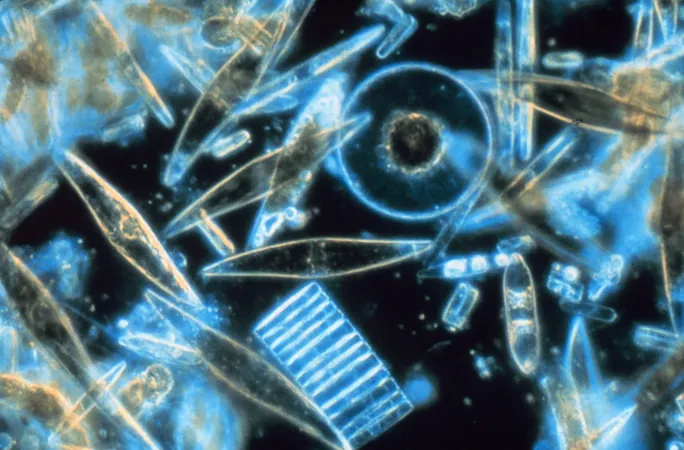
Ocean Scientists Stunned by Revolutionary Findings on Carbon Storage!
2025-01-13
Author: John Tan
Ocean Scientists Stunned by Revolutionary Findings on Carbon Storage!
In an earth-shattering revelation, researchers from the UK National Oceanography Centre (NOC) are rethinking everything they believed about carbon storage in the ocean. This new study introduces significant doubts regarding the critical role played by diatoms—microscopic plants that are a type of plankton—in the global carbon storage cycle known as the biological carbon pump.
Diatoms have long been recognized for their ability to draw carbon deep into the ocean, especially in the Southern Ocean, which absorbs approximately one-third of the organic carbon stored in the seas. They possess a unique silica-based exoskeleton, akin to a miniature glass house, previously thought to provide essential ballast for sinking, thereby aiding in the carbon transport to the deeper layers of the ocean.
However, the latest findings, drawn from data collected during two major expeditions to the Southern Ocean's "twilight zone" (the deep sea region between roughly 100 to 1,000 meters), reveal a shocking twist: diatom skeletons tend to remain near the surface, while carbon descends through different mechanisms. This revelation challenges the long-standing assumption that these microscopic plants are the primary agents in transporting carbon to greater depths.
Dr. Sari Giering, the lead researcher at NOC, stated, “For years, we believed diatoms were crucial in moving carbon to the deep ocean, effectively keeping it out of the atmosphere. This surprising finding forces us to rethink the biological carbon pump process entirely.” The biological carbon pump describes various processes where plankton absorb surface carbon and facilitate its descent to the ocean's depths. In light of this study, scientists may need to reassess the efficiency and reliability of these processes.
Dr. Giering emphasized that while previous studies primarily focused on carbon deposits at the seabed, their research highlights the complexities occurring within the twilight zone, potentially indicating a lesser role for diatoms than previously thought. "This raises the possibility of 'unknown' processes at play that require further investigation," she remarked.
Concerns have been escalating among climate scientists regarding how ocean warming could potentially affect diatom productivity, thereby weakening the biological carbon pump. However, the findings suggest that such changes "may not impact the Southern Ocean's carbon storage strength as drastically as earlier predicted," posited Jack Williams, the study's lead author and a researcher at the University of Southampton.
As scientists continue to navigate these intriguing waters with subsequent studies, understanding the dynamics of the twilight zone becomes increasingly critical for accurately predicting future carbon storage capabilities of our oceans. This groundbreaking research was conducted during two expeditions totaling more than five weeks at sea, where scientists explored diverse sites across the Southern Ocean.
Given the oceans' crucial role in the global carbon cycle and our ongoing climate crisis, this research has barked up the right tree but might just be scratching the surface of a whole new conundrum.
Stay tuned for more updates as scientists dive deeper into the mysteries hidden within the ocean depths!

 Brasil (PT)
Brasil (PT)
 Canada (EN)
Canada (EN)
 Chile (ES)
Chile (ES)
 Česko (CS)
Česko (CS)
 대한민국 (KO)
대한민국 (KO)
 España (ES)
España (ES)
 France (FR)
France (FR)
 Hong Kong (EN)
Hong Kong (EN)
 Italia (IT)
Italia (IT)
 日本 (JA)
日本 (JA)
 Magyarország (HU)
Magyarország (HU)
 Norge (NO)
Norge (NO)
 Polska (PL)
Polska (PL)
 Schweiz (DE)
Schweiz (DE)
 Singapore (EN)
Singapore (EN)
 Sverige (SV)
Sverige (SV)
 Suomi (FI)
Suomi (FI)
 Türkiye (TR)
Türkiye (TR)
 الإمارات العربية المتحدة (AR)
الإمارات العربية المتحدة (AR)